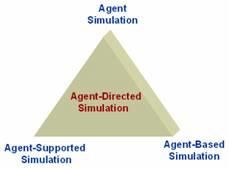|
Call
For Papers
Agent-Directed Simulation
Track of Sessions at the Summer Computer
Simulation Conference
(SCSC 2011)
June
27-30, 2011
World
Forum, The Hague, Netherlands
|
|
Organizers:
|

|
|
Dr. Tuncer I. Ören,
University of
Ottawa
Ottawa,
ON, Canada
oren@site.uottawa.ca
|
|
Dr. Levent Yilmaz,
Computer
Science and Software Engineering
Auburn
University
Auburn,
AL, USA
yilmaz@auburn.edu
|
|
Agent paradigm and its related
theory and methodologies opened new frontiers for advancing the physical,
natural, social, military, and information sciences
and engineering. Agent-directed Simulation consists of three distinct, yet related
areas which can be grouped under two categories as follows:
|
|
Use of Simulation for Agents
|
Use of Agents for Simulation
|
|
Agent Simulation:
simulation of agent systems.
Agent
simulation is already used in several categories of application areas such
as:
-
Engineering applications: electrical engineering, irrigation
systems, manufacturing systems, mechatronics, networks, robotics, software,
as well as transportation/logistics;
-
Management/economy applications: economy, e-commerce, and
management;
-
Social systems and human behavior applications: social systems,
psychology/human behaviour, physiology, negotiation, and organization
theory;
-
Environment applications: ecosystems, land use;
-
Military applications.
|
Agent-supported Simulation:
use
of agents in a simulation study for at least one of the following purposes:
(in a computer-aided simulation environment –including simulation-based
problem solving environments):
-
to provide
computer
assistance
for front-end
and/or back-end interface functions;
-
to
process elements of a simulation study symbolically (for example, for
consistency checks and built-in reliability); and
-
to
provide cognitive abilities to the elements of a simulation study, such as
learning or understanding abilities.
Agent-based Simulation: use of agents for the
generation of model behavior in a simulation study.
|
|
Agent-Directed Simulation
session of tracks aims to provide a leading forum to bring together
researchers and practitioners from diverse simulation societies. The
involvement of various agent-directed simulation groups will enable the
cross-fertilization of ideas and development of new perspectives by
fostering novel advanced solutions, as well as enabling technologies for
agent-directed simulation.
|
|
Technical
papers are solicited. Topics include, but are not limited to the
following areas:
|
|
Topics
|
|
|
|
Theory:
|
|
Methodology:
|
|
Agent-based
computational organization theory
|
|
Agent-based simulation systems
engineering
|
|
Agent
simulation of anticipatory systems
|
|
Agents in support of simulation
methodologies
|
|
Agent simulation
architectures
|
|
Computational
autonomy
|
|
Cooperative
autonomy and coalitions
|
|
Control of agent-based systems
|
|
Deliberative,
interpretive, and social agents
|
|
Design and validation of agent
simulations
|
|
Formal
models of agents and agent societies
|
|
Emergent law discovery in agent
simulations
|
|
Holonic
agent systems for cooperation and coopetition
|
|
Human behavior modeling and
simulation
|
|
Models of
competition, cooperation, coopetition, and negotiation
|
|
Simulation of self-organization
|
|
Agents
with understanding abilities for simulation
|
|
|
|
|
|
Applications:
|
|
Tools, Toolkits, and Environments
|
|
Business,
commerce, and transportation
|
|
Distributed
simulation for multi-agent systems
|
|
Computational
biology, health sciences
|
|
CASE tools
for agent-directed simulations
|
|
Ecosystems,
environment, urban planning
|
|
Agent
modeling tools and simulation engines
|
|
Military
applications
|
|
Agent
simulation programming languages
|
|
Computational
economics and finance
|
|
Standard
APIs for agent simulation programming
|
|
Human and
social dynamics
|
|
Agent
simulation verification, validation, testing tools
|
|
Engineering
and manufacturing
|
|
|
|
|
Author Guide:
|
The conference
committee will accept two types of papers submitted as a PDF file
to the conference website. Final version of all the papers MUST
COMPLY with the
SCS conference format. All the submitted papers will be peer
reviewed with respect to their quality, originality and relevance.
-
Full
manuscript: 8 pages in final conference format. In addition to
publication in the conference proceedings, they will be considered for
best paper award. Full
papers will be published both in hard copy and CD-ROM.
-
Work
in Progress: Short papers up to 6 pages in final conference
format.
Each paper must include
the title, authors, affiliations, addresses, references and summary
for proper positioning in the conference. Only original papers, written in
English, which have not been published previously elsewhere will be
accepted.
|
Final Paper Submission Guidelines:
Authors of
accepted papers are expected to attend the conference, present their work
to their peers, transfer copyright, and pay a conference registration fee
at the time their camera-ready paper is submitted. All papers will be
included in the conference proceedings and archived in digital libraries;
Full Papers will be also printed in hard copy.
The authors
of the accepted paper must (by the deadline):
(1)
finalize their papers taking into consideration the recommendations of the
reviewers;
(2) submit the final version of their papers electronically as a PDF file
to the conference website;
(3) submit the copyright transfer form; and
(4) register in advance for inclusion of their paper in the conference
proceedings.
|
Please
note the following
deadlines:
|
Special
session proposals:
|
|
October 31,
|
2010
|
|
Submission of papers:
|
|
February 28,
|
2011
|
|
Notification of acceptance:
|
|
March 30,
|
2011
|
|
Final submission:
|
|
April 30,
|
2011
|
|